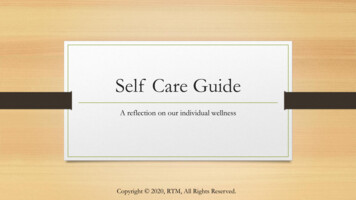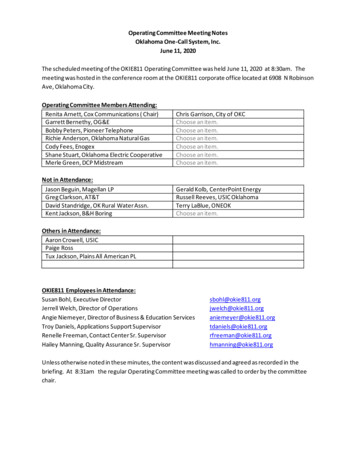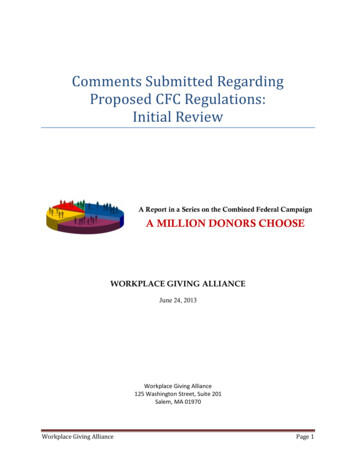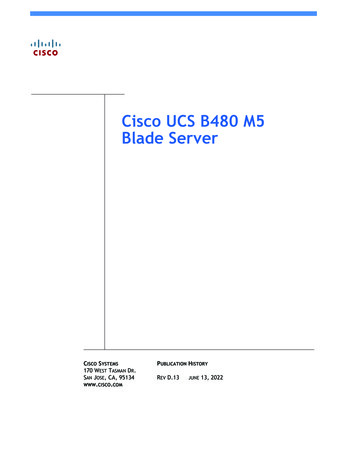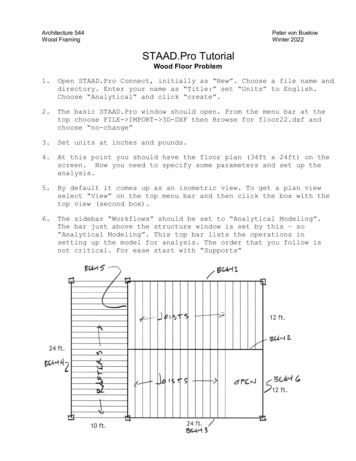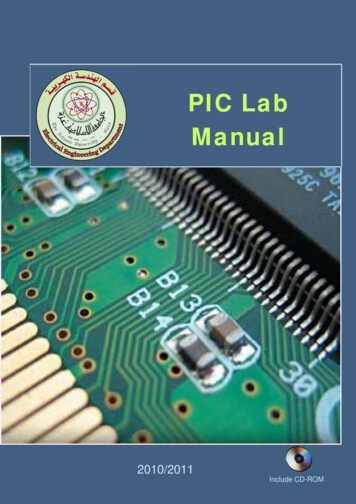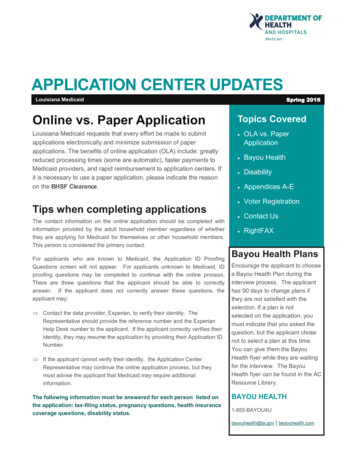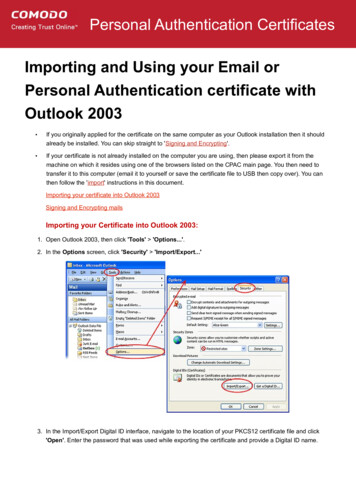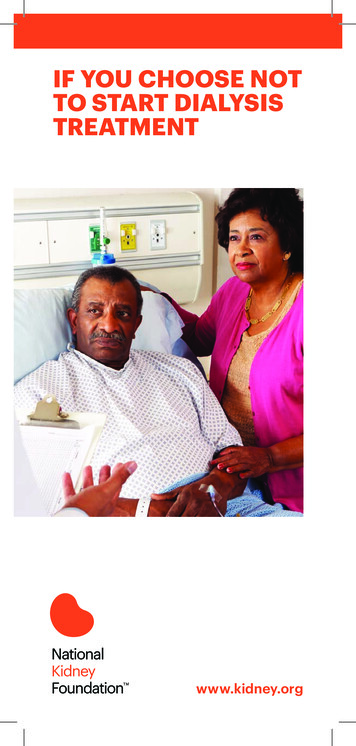
Transcription
IF YOU CHOOSE NOTTO START DIALYSISTREATMENTwww.kidney.org
For many people with kidney failure,dialysis helps them live longer andimproves their quality of life. Butfor some people, the improvementthey feel may be a lot more limited—often because of their serious healthproblems. It is important to know thatin such a situation, you have the rightto decide not to start dialysis. Beforemaking a decision, however, youshould discuss your thoughts carefullywith people you trust and seek advicefrom your doctor or other healthcareprovider, family member(s), your lawyeror others who have your best interestsat heart. This booklet has been writtento answer some general questions youmay have about the choice not tostart dialysis.Can I really decide not to startdialysis treatment?Yes. You have the right to decide not tostart dialysis if you feel that the burdensoutweigh the benefits to you. If you arenot able to make this kind of decision,someone (such as a family member,lawyer, etc.) can make this decisionon your behalf. The person you nameto make such decisions is called yoursurrogate. (See next question.)2NATIONAL KIDNEY FOUNDATION
How do I go about namingsomeone to be my surrogate?A surrogate is someone you choose tomake decisions for you if you are notable to make them yourself. Naminga surrogate is done by filling out aform known as an advance directive,a healthcare proxy, or a durablehealthcare power of attorney. It isimportant to make sure the personyou name is willing to act on yourbehalf. It is also very important thatyou tell the person about your wishesand values so that he or she can makethe decisions you would make if youwere not able to speak for yourself. Itwill be helpful to your surrogate if yougive clear directions on your advancedirective form about dialysis and/orother medical treatments you wouldwant or not want.WWW.KIDNEY.ORG3
The role and responsibilities of thesurrogate, as well as the types ofdecisions the surrogate may make,vary from state to state, dependingon the laws of each state. Generally,the surrogate must follow your wishes.For more information about naminga surrogate and about the laws inyour state, you may want to speakwith an attorney or your local orstate bar association. You may alsoobtain copies of the forms used inyour state by calling or writing to the:National Hospice and Palliative CareOrganization, 1731 King Street, Suite100, Alexandria, VA, 22314; phone:800.646.6460 or 703.837.1500;www.nhpco.org. (Also see theNational Kidney Foundation bookletAdvance Directives: A Guide forPatients and Their Families.)Will my doctor help me decidewhether to start treatment?Yes. Your doctor will speak with youabout what dialysis treatment involvesand what deciding not to start dialysiswould mean for you. While you tryto make this decision, you may alsowant to get advice from people whoprovide emotional support to you andyour loved ones and other trainedprofessionals, such as your social4NATIONAL KIDNEY FOUNDATION
worker. However, the final decisionabout starting or not starting treatmentremains with you or your surrogate.Suppose I am not sure whetherdialysis could help me?Sometimes it may not be clear whetherthe benefits of dialysis outweigh theburdens. Each person’s situation isdifferent. If you are uncertain, youmay be able to start treatment fora trial period—for example, one tothree months. During and after thetrial period, your doctor and the othermembers of your dialysis team will talkwith you about how you are feelingand coping with the treatment routine.Ask as many questions as you needto help with your decision to continueor to stop treatment.How do I discuss this decisionwith my family and friends?Many people find it difficult totalk about whether or not to starttreatment, and they worry about howothers will feel and react. Althoughyou may find it hard at first, thebest approach is to discuss yourfeelings openly with your loved ones.Your family will most likely feel veryemotional too, and may have questions.You may wish to include, other peopleWWW.KIDNEY.ORG5
in this discussion whose advice youvalue, such as your religious or spiritualadvisor, social worker, doctor or otherhealthcare worker.Will I be asked to speak toa mental health professional?If your doctor is concerned that youmay not want to start dialysis for anemotional reason, such as depression,he or she may ask you to speak witha psychiatrist, social worker or othercounseling professional. Depressionmay be treated successfully withcounseling, medicine or a combinationof both. Your doctor may also wantyou to speak with a mental healthprofessional to make sure youunderstand the full impact of choosingnot to start dialysis.How long will I live if I choosenot to start dialysis?There is no certain answer to thisquestion. It varies, because everybodyis different. Each person’s medicalstatus is unique. People with kidneyfailure may survive days to weekswithout dialysis, depending on theamount of kidney function they have,how severe their symptoms are, andtheir overall medical condition.6NATIONAL KIDNEY FOUNDATION
Is death from kidney failure painful?Not usually. If you do feel anydiscomfort, pain medication may beprescribed for you. Without treatmentfor kidney failure, toxins, and fluidwill build up in your body, makingyou feel increasingly tired, nauseousand itchy. These symptoms can becontrolled with medication and othersupportive measures to make youmore comfortable and lessen youranxiety. The fluid build-up can makeit more difficult for you to breathe.Your doctor can prescribe medicationor a treatment called ultrafiltrationto remove fluid and make breathingeasier for you. Your doctor may alsorecommend that you limit your intakeof salt and fluids to reduce fluidweight gain.Is deciding not to start dialysisconsidered suicide?Many religions believe people havethe right to refuse medical treatment,including dialysis, if they feel it will nothelp them and will be burdensome.You may wish to speak with yourreligious or spiritual advisor if you haveconcerns about this.WWW.KIDNEY.ORG7
What type of food and drinkcould I have?Typically, there is no reason for youto continue to follow your kidney dietonce you choose end-of-life care.In fact, favorite foods and beveragesare usually encouraged. Your doctor,nurse, and dietitian can answer otherspecific questions you may have aboutfood and fluid intake.If I make this decision, will mydoctor continue to help me?Yes. Your doctor should be availableto you and your family to discuss yourconcerns and advise you about thetype of care you might need. Yourdoctor should work with members ofyour healthcare team to arrange thenecessary referrals or consultationsfor your circumstances. Otherprofessionals, such as the socialworker or nurse who has been partof your healthcare team should alsoremain available to you.Do I have a choice of where I die?Your wishes about where you wantto die will be honored as much aspossible. Many people choose todie at home, where they feel morecomfortable in familiar surroundings.If you choose this option, a hospice8NATIONAL KIDNEY FOUNDATION
or home health agency may assistyou and your loved ones in makingany special arrangements for yourcare at home. A nursing home maybe an option for some people.Admission to the hospital may notbe a consideration, depending onyour insurance coverage and overallmedical condition.Could I get hospice care?If you choose not to start dialysis, yourequire end-of-life care and you areeligible for hospice services. The typeof hospice care available may be eithera home hospice program or a hospicefacility. A social worker, a visiting nurseservice or home care agency may beable to help you and your loved onesmake arrangements for hospice care.Hospice services usually include somevisits from a nurse, a home health aid,and a social worker.For more information about hospiceprograms in your community, speakwith your doctor, nurse or socialworker. You may also be able toget information from your religiouscommunity, or from friends andneighbors who have had experiencewith hospice care. If you are a seniorcitizen, you can contact a local seniorWWW.KIDNEY.ORG9
center or the local or state Office onAging. Also check your local yellowpages and Internet resources such aswww.hospicedirectory.orgIf I choose to die at home, can I geta home healthcare worker to helpmy family care for me?The types of services covered at homewill depend on your insurance. If youare in a home hospice program, ahome health aide may be available toassist. If your insurance does not covera home health aide, and you and yourloved ones wish to pay privately forthese services, you can do so. Theremay also be government programsto help with costs. Ask your doctor,social worker, and community orgovernment agencies about availableand affordable home services.Will I still be covered by Medicareand/or my private medicalinsurance if I stop treatment?Your Medicare coverage will not end,even if you decide to stop dialysis. Itis important that you and your familyspeak with your doctor about the typeof care you will need. Once this isdecided, you can check on whether ornot Medicare and/or private insurancewill cover this care.10NATIONAL KIDNEY FOUNDATION
If I change my mind,can I go back on dialysis?You may start or return to dialysis ifyou change your mind. If you havemissed several treatments, you mayhave some discomfort when you firststart dialysis again. You will requirevascular access if you do not alreadyhave a working dialysis fistula. Youshould discuss the possibility ofreturning to dialysis with your doctor.WWW.KIDNEY.ORG11
Is there anything else I shouldknow about not starting dialysis?If you decide not to start treatment, youor your surrogate may want to makesure the following items are in order: Signed “Advance Directives”documents that comply with yourstate law. “Advance Directives”refer to documenting your healthand medical treatment wishes anddesignating a surrogate. You do notneed a lawyer to complete advancedirectives. There are usually threetypes of advance directives:Living Will: This specifies whatkind of medical treatment youwant if you become unable tomake decisions yourself—forexample, the use of life-sustainingtherapies or equipment like CPR(cardiopulmonary resuscitation)and ventilators, feeding and othertreatments like pain medication.Healthcare Proxy: This specifieswho you choose to makehealthcare decisions for youif and when you become unableto make them yourself.Durable Healthcare Power ofAttorney: This provides power ofattorney to someone you chooseto make decisions on your behalfon all matters other than medical(e.g., legal, financial, banking andbusiness matters), if and when12NATIONAL KIDNEY FOUNDATION
you become unable to makedecisions yourself. This documentallows the person you choose tomake bank transactions, pay bills,and take care of other importantmatters, if and when you are notable to take care of them yourself. An inventory, including the locationof your bank, brokerage and otherfinancial accounts, stock and bondholdings, real estate and businessrecords, medical and otherinsurance policies, pension plansand other legal papers The names, addresses andtelephone numbers of yourattorney, accountant, familymembers and other loved ones,friends and business associateswho should be notified of yourdeath or who may have informationthat will be helpful in dealing withyour estate A statement about your preferencefor funeral/memorial services,burial or cremation instructions,and decisions about organand tissue donation A written, video- or audio-tapedmessage to family membersand other loved ones, businessassociates and friends, if youchooseWWW.KIDNEY.ORG13
If you provide care for loved ones,a plan for how their care will beprovided for after your death.Additional information about advancedirectives, living wills, healthcareproxies or durable healthcare powersof attorney may be obtained from yourlawyer, if you have one, or your local orstate bar association. These forms aredownloadable from the Internet. Youmay also obtain copies of the formsused in your state by contacting theNational Hospice and Palliative CareOrganization (see page 4 for contactinformation), or by visiting yourlocal library.14NATIONAL KIDNEY FOUNDATION
What if I have more questions?If you have more questions aboutmedical concerns, speak with yourdoctor, social worker, nurse or otherpeople whose advice you trust.Other ResourcesCall the NKF Cares Patient HelpLine toll-free at 855.NKF.CARES(855.653.2273) or emailnkfcares@kidney.orgCoalition for the SupportiveCare of Kidney Patients:www.kidneysupportivecare.orgThe following free NKF booklets maybe helpful:Advance Directives: A Guide forPatients and Their FamiliesOrder# 11-10-0803, www.kidney.org/atoz/pdf/AdvanceDirect.pdfChoosing a Treatment for Kidney FailureOrder# 11-10-0352, www.kidney.org/ATOZ/pdf/choosing treat.pdfWhen Stopping Dialysis TreatmentIs Your Choice Order# fLearn more at www.kidney.orgWWW.KIDNEY.ORG15
The National Kidney Foundation is the leadingorganization in the U.S. dedicated to theawareness, prevention, and treatment of kidneydisease for hundreds of thousands of healthcareprofessionals, millions of patients and theirfamilies, and tens of millions of Americans at risk.Help fight kidney disease.Learn more at www.kidney.org30 East 33rd StreetNew York, NY 10016800.622.9010 2008 National Kidney Foundation, Inc. 11-10-0330 IBD
a home hospice program or a hospice facility. A social worker, a visiting nurse service or home care agency may be able to help you and your loved ones make arrangements for hospice care. Hospice services usually include some visits from a nurse, a home health aid, and a social worker. For more information about hospice


